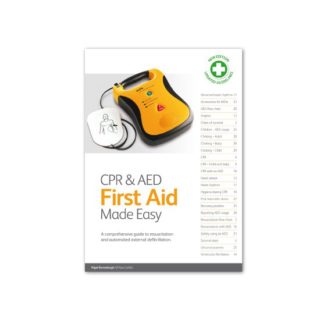Description
CPR and AED First Aid Made Easy Book
CPR and AED First Aid Made Easy (Edition 3.2) has been designed to complement Automated External Defibrillation courses.
- Updated with the latest guidelines.
- Suitable for all makes of Automated External Defibrillator.
- Covers all Resuscitation Council (UK) core competences.
- Simple, accurate information with lots of full-colour pictures and diagrams.
- A logical and easy to understand layout.
- Written by an experienced paramedic and first aid instructor.
Statement on the training required to use an AED by the Resuscitation Council
The majority of people who survive a cardiac arrest are resuscitated from ventricular fibrillation (VF) by the administration of a defibrillation shock. This is most likely to be successful when it is given very soon after the onset of VF; emergency service personnel are often unable to arrive soon enough to help a victim.
Automated external defibrillators (AEDs) are designed to be used by members of the public and are very effective at guiding the operator through the process of administering the shock. They have become widely available, are safe and easy to use, and will not allow a shock to be given to a victim who does not require one.
AEDs have been used frequently by laypeople with modest training, and many reports testify to the success of this strategy. Operators without formal training have also used AEDs successfully to save lives.
While it is highly desirable that those who may be called upon to use an AED should be trained in their use, and keep their skills up to date, circumstances can dictate that no trained operator (or a trained operator whose certificate of training has expired) is present at the site of an emergency. Under these circumstances, no inhibitions should be placed on any person willing to use an AED.
It is the view of the Resuscitation Council (UK) that the use of AEDs should NOT be restricted to trained personnel. Furthermore, the Resuscitation Council (UK) considers that it is inappropriate to display notices to the effect that only trained personnel should use the devices, or to restrict their use in other ways. Such restrictions are against the interests of victims of cardiac arrest and discourage the greater use of AEDs by members of the public who may be able to preserve life and assist victims of cardiac arrest. This confirms similar advice from the British Heart Foundation.
The principles contained in this statement are aimed primarily at laypersons, first aiders and those who do not work as healthcare professionals. In healthcare environments where an AED is available, it is important that all staff who may be called on to use it are trained and that their qualifications are kept up to date. The status of training is a subject that should be reviewed during the annual appraisal process.
The Resuscitation Council (UK) advises that NHS Trusts should ensure that no restriction is placed on the use of an AED by an untrained NHS employee confronted with a patient in cardiac arrest when no more highly trained individual is present. The administration of a defibrillation shock should not be delayed waiting for more highly trained personnel to arrive. The same principle should apply to individuals whose period of qualification has expired.
Do you have a question about this product? – “Ask Wessex”











Reviews
There are no reviews yet.